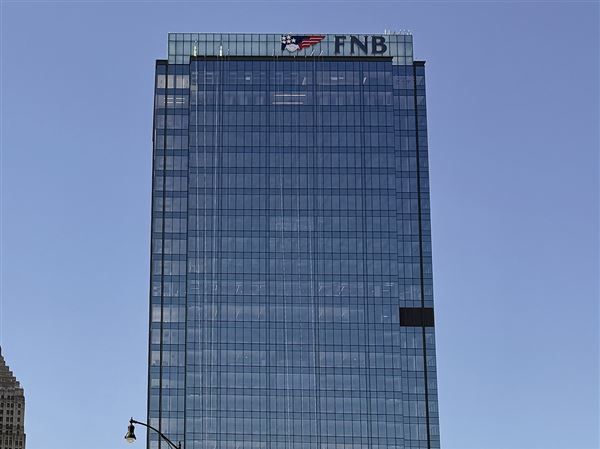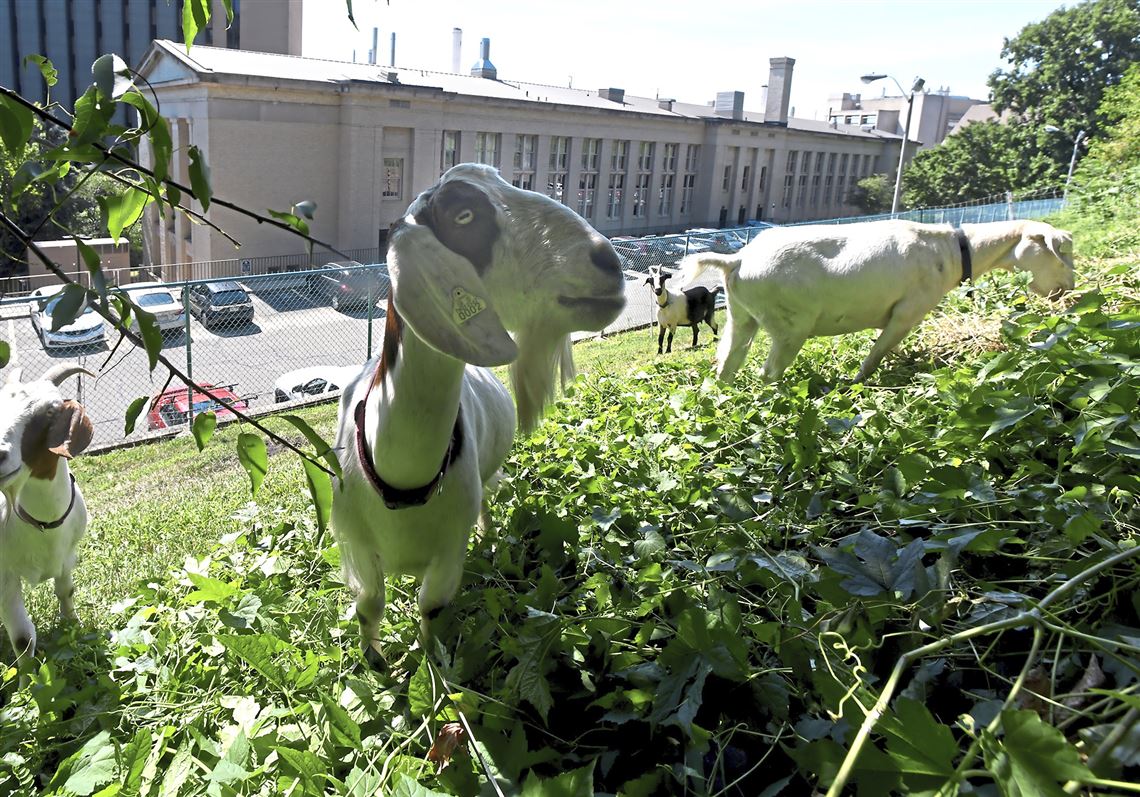A dozen goats from Collier have been working for a week and a half at the University of Pittsburgh, munching on weeds and invasive overgrowth. They can even handle poison ivy and thorns without so much as a bleat.
Pitt has ventured into the world of goatscaping as part of its sustainability plan, hiring on 12 of Rainy Laux’s 36 goats to forage on the overgrown hillside behind Eberly Hall and another acre behind the Fitzgerald Field House for the next two to three weeks. The electric fence that surrounds their work area is powered by a solar panel the size of a laptop.
The kids — most of them are older than kids, but it’s fun to call them kids — will relieve Andy Moran’s groundskeeping staff of 160 hours that they can spend working elsewhere. Plus, these wonders of rumination work quietly. No fuel costs, no exhaust or emissions — no harmful ones, anyway — and no buzzing, hacking, droning sounds of machines. Just some cud chewing that’s not very audible.
As a bonus, Pitt gets to keep the little pellets that come out the back end, extrusions that look like Milk Duds, as fertilizer.
Pitt doesn’t want to report how much the contract is for, Mr. Moran said, adding that it costs less than human labor. He said his human crews would not be doing this work in the summer, anyway.
He said he expects Pitt’s continuing use of goats to clear vegetation.
The goats need a day to get used to new surroundings, then they do what kids do: they start scarfing. Then they play. Then they eat. Then they play, maybe with a little half-hearted head-butting.
The result after a week? “Definitely surprised,” Mr. Moran said. “Thrilled, pleased with the progress they’ve made. My crews couldn’t get it that close to the ground with the limitations of equipment.”
Goats have been called on to chew up unwanted vegetation all over the city and region for several years. In 2014, in what appears to be the first such event in the city, 30 goats traveled from Goodness Grows Farm in Saxonburg to clear a hillside in Polish Hill.
The city approved but had no process in place for the systematic use of goats as weed eaters.
That changed the next year, when the city began an agreement with Allegheny GoatScape, a nonprofit in the city.
In the spring, City Council voted to extend for five years the license agreement it has with Allegheny GoatScape, whose goats have chewed through weeds on city-owned properties including West Penn Park, Highland Park, Emerald View Park and South Side Park.
Allegheny GoatScape’s owner, Gavin Deming, said the organization, and sometimes its clients, raises money to pay for the work its goats do.
Ms. Laux started her business, Have U Herd, three years ago.
“I always wanted to raise animals, and I chose goats because I wanted to do this,” she said, extending her arm toward the overgrowth at Pitt. “I interned with a goatscaper in Massachusetts” and “fell in love.”
She said she has been busy transporting her animals to landscaping jobs, but she also rents them out for parties, photo shoots and goat yoga. That’s where you do yoga and the goats stand around looking at you.
Her herd is still young. The oldest is 4, but age earns no honors. Everyone honors the matriarch, Cypress, whose back legs have been left to grow a lovely curtain of hair that Ms. Laux called pantaloons and Mr. Moran called hairy legs.
“She’s the queen, so whatever she does they will follow,” Ms. Laux said. “In stressful situations, they look to her for guidance.”
Diana Nelson Jones: djones@post-gazette.com.
First Published: July 22, 2018, 3:38 a.m.



















